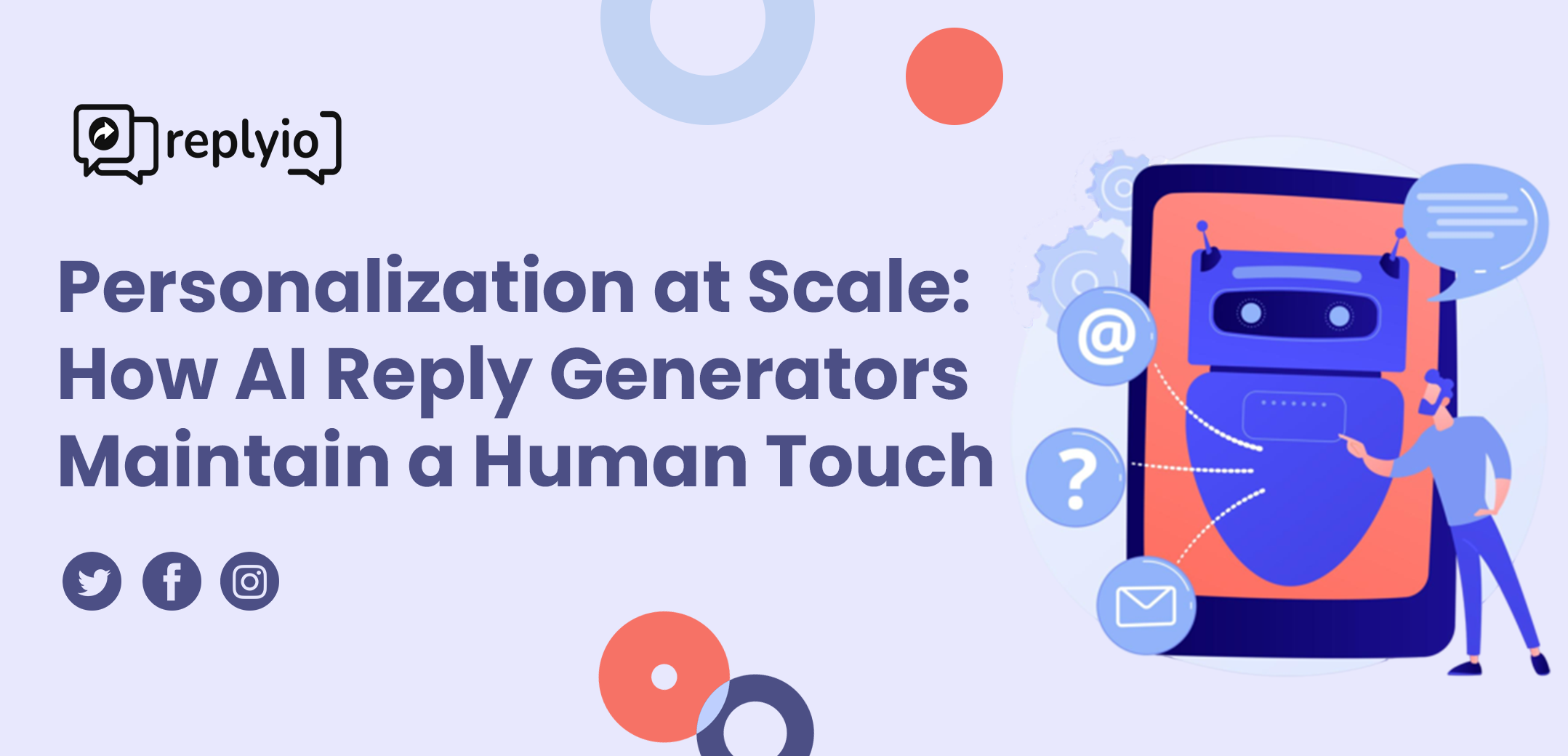Replyio
Personalization at Scale: How AI Reply Generators Maintain a Human Touch
-
Jul 28, 2024
-
11 min read

In today’s digital landscape, customer engagement is everything. Businesses are striving to build meaningful connections with their audience. But as companies grow and customer bases expand, the ability to maintain that personal touch becomes increasingly difficult. Enter AI reply generators—a technological advancement that promises to make scaling personalization possible without losing the human touch.
But can AI really replace human interaction in a way that feels genuine? Let’s explore how AI reply generators are evolving to keep responses personal and, most importantly, human.
The Rise of AI in Customer Communication
AI-powered reply generators are rapidly becoming a go-to solution for businesses managing high volumes of customer interactions. With the help of machine learning, these systems analyze customer inquiries and craft personalized responses in real-time. However, it's not just about efficiency; the real challenge is ensuring the responses don’t feel robotic.
The days of receiving generic, cookie-cutter replies from a brand are dwindling. Today’s consumers expect more—they want timely, thoughtful responses that acknowledge their individual needs. AI reply generators are stepping up to meet this expectation by using advanced natural language processing (NLP) to craft tailored replies that mimic human behavior.
How AI Reply Generators Keep It Personal
1. Contextual Understanding
AI systems have evolved to understand not only the content of a message but also its context. This means they can respond with appropriate empathy, humor, or professionalism based on the nature of the customer’s inquiry. They can even pick up on nuanced emotional cues, such as frustration or excitement, and adjust their tone accordingly.
For example, a customer expressing frustration over a late delivery would receive a response acknowledging their frustration and offering a solution, as opposed to a standard, templated apology.
2. Leveraging Historical Data
AI reply generators can reference previous interactions to offer continuity in conversations. This allows for more personalized and coherent replies. If a customer has inquired about a product in the past, the AI will remember and address it in future communications, making the conversation feel more natural and less transactional.
This feature replicates what a human customer service representative might do when trying to maintain rapport with a returning customer. Instead of starting from scratch, the AI continues the conversation from where it left off.
3. Dynamic Content Generation
AI models are now capable of generating dynamic, varied responses rather than relying on rigid scripts. This variability ensures that customers don’t feel like they’re speaking to a bot, even if they are. By using natural sentence structures, varying word choices, and incorporating subtle details, AI-generated replies can appear as though they’ve been written by an actual person.
Some advanced models even allow for humor or casual phrasing when appropriate, making the interaction feel more genuine and less automated.
4. Real-Time Learning
One of the key strengths of AI systems is their ability to learn from every interaction. As they receive more data, they continuously improve their responses by identifying patterns and customer preferences. This real-time learning enables the AI to become more personalized with each reply, refining its ability to mimic human interaction.
For instance, if customers tend to respond positively to a certain tone or style, the AI will adjust its future replies to align with those preferences.
The Balance Between Automation and Human Touch
While AI reply generators are revolutionizing customer engagement, it’s important to recognize that there is still a need for human oversight. AI can handle the bulk of customer interactions, but in certain situations—such as highly sensitive or complex inquiries—a human touch is irreplaceable.
Businesses that combine AI with human intervention are more likely to succeed in balancing efficiency with empathy. AI can take care of routine tasks, freeing up human agents to focus on high-impact interactions, ensuring that no customer feels neglected.
Why Maintaining a Human Touch Matters
in an era where automation is everywhere, humanizing interactions has become a competitive differentiator. Customers are more likely to trust a brand that makes them feel valued, and AI reply generators are helping businesses achieve this at scale.
The key to success lies in developing AI systems that not only understand language but also the emotions behind it. This is the cornerstone of building lasting, authentic relationships with customers.
AI-Driven Personalization Done Right
AI reply generators are no longer just a tool for answering queries quickly—they’ve become a strategic asset for building meaningful, scalable customer relationships. By leveraging advanced NLP, context-awareness, and real-time learning, these systems are evolving to maintain a balance between efficiency and a personal touch.
As technology continues to improve, we can expect AI reply generators to become even more adept at replicating human interaction, providing the thoughtful and authentic experiences that customers crave.
In the future, personalization at scale will be less about choosing between AI or human interaction—it will be about seamlessly integrating the two for the best possible customer experience.

